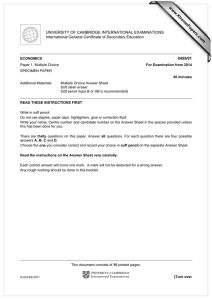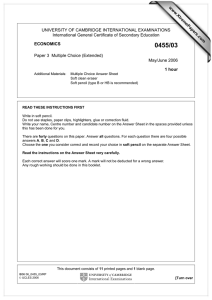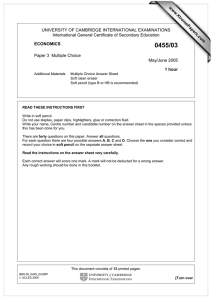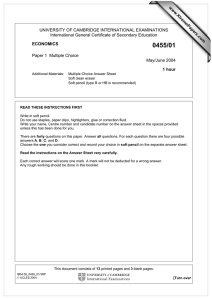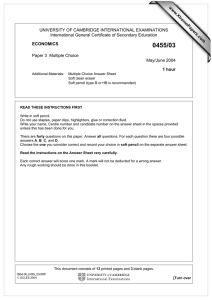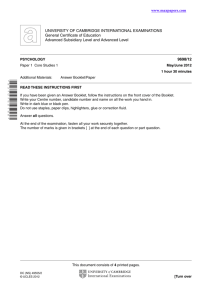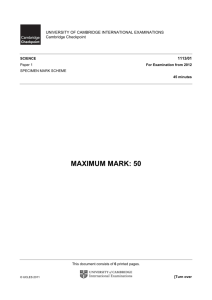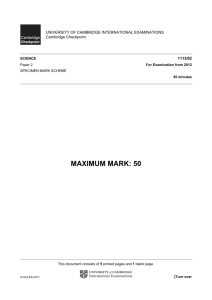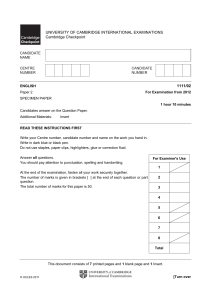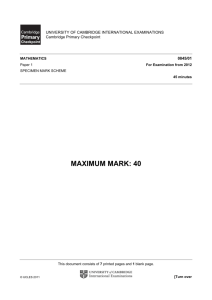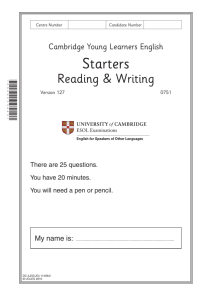IGCSE Economics Multiple Choice Exam Paper
advertisement
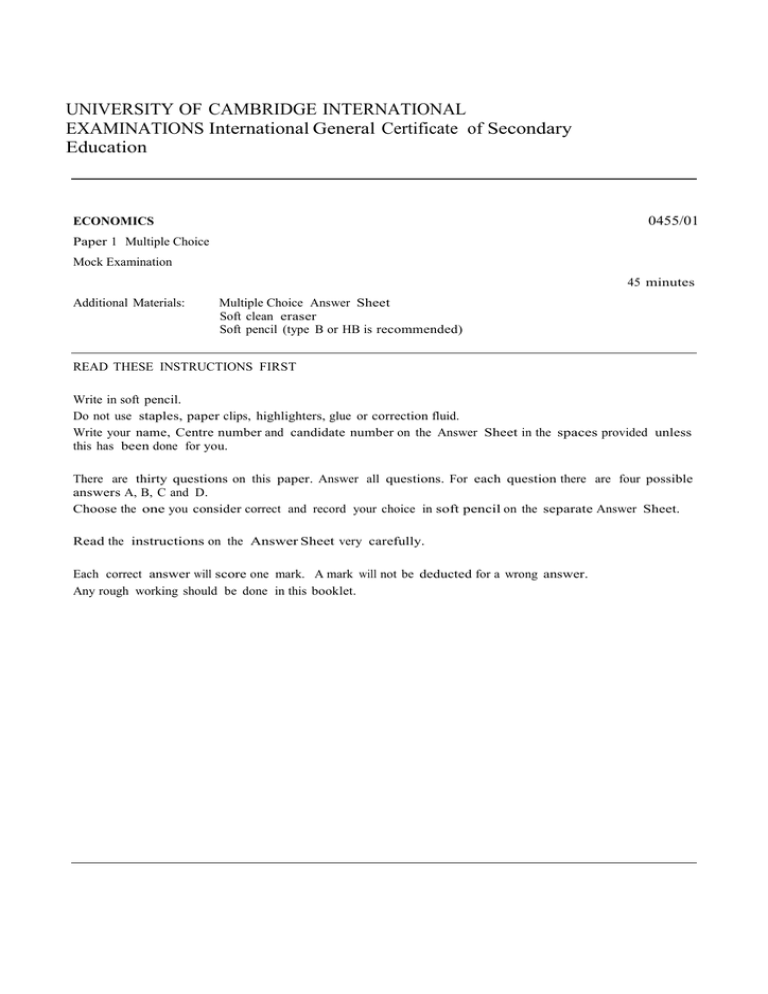
UNIVERSITY OF CAMBRIDGE INTERNATIONAL EXAMINATIONS International General Certificate of Secondary Education 0455/01 ECONOMICS Paper 1 Multiple Choice Mock Examination 45 minutes Additional Materials: Multiple Choice Answer Sheet Soft clean eraser Soft pencil (type B or HB is recommended) READ THESE INSTRUCTIONS FIRST Write in soft pencil. Do not use staples, paper clips, highlighters, glue or correction fluid. Write your name, Centre number and candidate number on the Answer Sheet in the spaces provided unless this has been done for you. There are thirty questions on this paper. Answer all questions. For each question there are four possible answers A, B, C and D. Choose the one you consider correct and record your choice in soft pencil on the separate Answer Sheet. Read the instructions on the Answer Sheet very carefully. Each correct answer will score one mark. A mark will not be deducted for a wrong answer. Any rough working should be done in this booklet. 2 1 Nolwazi lived in a rural area in Botswana and made baskets to sell to the tourists. The local government gave her a loan to buy a car to take the baskets to the city market. Which factor of production increased? 2 3 A capital B enterprise C labour D land What, according to the definition of opportunity cost, is sacrificed when a decision is taken? A an identical alternative B any possible alternative C the least valuable alternative D the next best alternative A friend said his French grandmother kept switching off the lights but left the tap running. His Namibian relative left the lights on while shouting at him to turn off the water. Which availability of resources and level of prices would make economic sense of these consumer actions? in France in Namibia A adequate water supplies expensive electricity B cheap electricity adequate water supplies C expensive electricity scarce water supplies D scarce water supplies cheap electricity © UCLES 2011 0455/01/SP/14 3 4 The table shows the value of output for some parts of an economy. $ billion fishing 25.0 mining 23.0 manufacturing 130.5 financial services 100.3 other services 170.0 Which conclusion may be drawn from these statistics? 5 A The tertiary sector was the most valuable. B The value of the primary sector was $ 25.0 billion. C The value of the secondary sector was $ 153.5 billion. D The value of the secondary sector was worth less than the value of the primary sector. A government decides that an economy should make more use of the market. Which policy might help to achieve this? A a decrease in controls on imported goods B an increase in government ownership of land C an increase in subsidies to industry D the fixing of minimum wage levels for workers © UCLES 2011 0455/01/SP/14 [Turn over 4 6 The diagram shows an initial equilibrium point (X) in a market and a new equilibrium point (Y). Y X price O quantity Which combination of changes in demand and supply could have caused the movement from X to Y? 7 demand supply A decrease decrease B decrease increase C increase decrease D increase increase A large supermarket applied to build on land which was an area of natural beauty. The local government allowed the building, even though the natural beauty of the area would be lost, because many jobs would be created and much needed income would be brought to the local community. Which economic ideas cannot be found in the above statement? 8 A external cost and private enterprise B free market and the conservation of resources C opportunity cost and improved standards of living D public sector and external benefit For what would price elasticity of demand be used? A calculating current disposable income B calculating the rate of price inflation C estimating changes in a company’s cost D identifying changes in consumer spending patterns © UCLES 2011 0455/01/SP/14 5 9 What is an external benefit when a charge is made for vehicles entering a city centre? A increased government revenue B increased traffic C reduced air pollution D reduced business activity 10 In August 2007 the Central Bank of Swaziland increased its interest rate from 9.5% to 10%. Which effect would this be likely to have on producers and consumers? producers consumers A borrow less save more B borrow less spend more C invest more save more D invest more spend more 11 Why might a family increase the proportion of its income it spends on food? A Some of the children start work. B The government increases the benefits it pays to families. C The number of children in the family increases. D The second parent becomes employed. 12 In 2007 the average annual pay of a scientist in the UK was £37 290. The average annual pay of a laboratory technician was £26 157. What could explain this difference in earnings? A Laboratory technicians have stronger bargaining power than scientists. B Laboratory technicians have to work more unsociable hours than scientists. C The period of training for scientists is longer than that for laboratory technicians. D The supply of scientists is high relative to demand for their services. 13 What distinguishes a multi-national company from other companies? A It has agents in other countries. B It produces in other countries. C It takes part in international trade. D It uses raw materials and components from more than one country. © UCLES 2011 0455/01/SP/14 [Turn over 6 14 Cadbury Schweppes, the confectionery business, is reported to want to reduce the number of its offices in an attempt to decrease its general and administrative costs. Which type of cost does Cadbury Schweppes hope to decrease? A average variable cost B marginal cost C total fixed cost D total variable cost 15 Prices tend to be lower in a competitive industry than in a monopoly. Why is this? A A monopoly has less influence on the market. B Competitive industry has more economies of scale. C New firms are free to enter the competitive industry. D Profits are lower in a monopoly. 16 India is experiencing rapid growth in air travel. The number and size of airlines is increasing every year. Which effect arising from this growth is an external economy of scale? A Banks are more prepared to lend to large airlines rather than small airlines. B Fuel suppliers charge less to airlines that buy in bulk. C Institutions are established to train flight crew. D Larger airlines operate aircraft which can carry more passengers. 17 The table shows the total cost of a firm. It can sell the units for $6 each. quantity produced (units) 3 4 5 6 total cost $ 12 15 20 27 How many units will the firm produce to maximise profits? A 3 © UCLES 2011 B 4 C 5 0455/01/SP/14 D 6 7 18 Economic growth can be defined as A an increase in a country’s exports. B an increase in a country’s population. C an increase in the productive capacity of an economy. D a reduction in inflation. 19 A country has different rates of income tax depending on the level of income earned. The highest rate of income tax is cut from 40% to 38%. From this statement it can be deduced that taxation will become A less indirect. B less progressive. C less regressive. D more difficult to evade. 20 What will make an industry capital-intensive? A employing many unskilled workers B manufacturing expensive products C occupying cheap land D using expensive equipment and a small labour force © UCLES 2011 0455/01/SP/14 [Turn over 8 21 The graph shows the labour force of a country from 2003–2015. What may be concluded from the graph? 22 A Between 2003 and 2015, women will become a higher percentage of the labour force. B It is estimated that more girls than boys will be born between 2003 and 2005. C The labour force will remain relatively unchanged after 2006 at approximately 16 million. D The total population of the country in 2010-2011 will be approximately 28 million. In 2008 inflation was close to 100 000% in Zimbabwe. In a bid to reduce this high rate, the Zimbabwean Government imposed maximum prices on a range of products. This caused price rises amongst those goods sold unofficially or illegally. What could explain this? A The maximum prices increased demand whilst reducing supply. B The maximum prices reduced demand whilst increasing supply. C The maximum prices were set above the equilibrium price levels. D The maximum prices were set at the equilibrium price levels. © UCLES 2011 0455/01/SP/14 9 23 The table shows a number of economic indicators for four countries in 2004. Which country best fits the description of ‘the fastest real economic growth with the strongest international position’? country GDP (annual % change) prices (annual % change) trade balance ($bn) foreign reserves ($bn) A Chile 4.8 1.1 +6.2 15.9 B Hungary 4.2 7.5 – 4.2 12.6 C Peru 4.2 4.3 +1.5 10.4 D Philippines 6.4 5.1 –1.3 13.0 24 As a result of a decrease in the demand for coal, several coal mines were closed. What type of unemployment would this cause? A cyclical B frictional C seasonal D structural 25 Which factor is most likely to reduce the average age of a population in a developed country? A a lower birth rate B a lower death rate C emigration D immigration 26 What is most likely to be found in a typical developing country? A a good education sector B a small average family size C a small percentage of very old people D high spending on entertainment © UCLES 2011 0455/01/SP/14 [Turn over 10 27 The Chinese Government is concerned about two population problems – overpopulation and a gender imbalance, with males outnumbering females. In 2007 it reduced the number of babies that foreigners are allowed to adopt; almost all of the babies are girls. What effect might this have on the size of China’s population and gender imbalance in the short run? size of population gender imbalance A increase increase B increase reduce C reduce increase D reduce reduce 28 What benefit is likely to result from the extension of specialisation within manufacturing? A For a consumer, there are more individually made goods available. B For a consumer, there could be a lower cost of living. C For an employee, job satisfaction will increase. D For an employee, the nature of work is more varied. 29 The diagram shows the value of exports and imports of goods of a country in five years. Between which two years did the country have an increase in the value of imports and an improvement in its trade balance? A 1 and 2 B 2 and 3 C 3 and 4 D 4 and 5 © UCLES 2011 0455/01/SP/14 9 30. Why are schools sometimes built and run with government money? A The private sector could not afford the cost of investment to build schools. B The private sector would have lower standards than government schools. C The provision of schools by the government ensures the widest choice for students. D There are external benefits from the provision of education. © UCLES 2011 0455/01/SP/14 [Turn over
